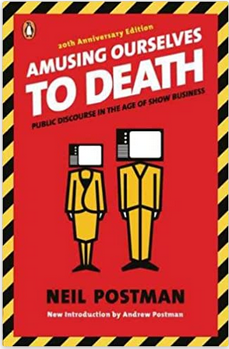We are drowning in it. There are printed and spoken words, images, and video crashing down upon us constantly. We control some of that flow, but to much of that input we are simply the passive recipients… if not victims. Inputs arrive in the forms of conversation, news, radio, internet, advertising, podcasts, articles, blogs, books, frequent and distracting text messages, and an endless array of entertainment platforms delivered across screens whose sizes vary from many thousand square feet stadium videoboards to IMAX to television to computer to handheld and wristband. Topics may be social messaging, politics, medicine, science, tech, history, finance, religion, popular culture and surely much more.
The external pressures to receive and be influenced by data are ridiculous. Regardless of source, each communication is sent with purpose – the origins of which may be healthy, productive and informative or which may have goals of persuasion, marketing, monetary gain, manipulation or control. All of these messages are sent (and received) through filters, bias, experience-determined and individualized perspective, beliefs, preferences, personality and world views. Some of us are more adept at crafting messages. Some are more skilled in processing them. Some are challenged as both sender and receiver. These processes are complex and may have far-reaching consequences.
To imagine a “Communication History of the World” timeline which chronologically plots the number of messages received by the average person on a daily basis, we could envision that very low, horizontal line starting in the era of grunting then proceeding to verbal speech to written language to the printing press to electronic telegraph to radio to television and to include internet communication today. That graph would show minimal change for millenia then a massive explosion of messaging which continues exponential growth today. It is now the norm for children in developed nations to practically be born with an electronic device in their hands, streaming incessant data and input to their brains.
How will humanity adapt to these constant external inputs? How do we appropriately filter these information flows to avoid drowning,… or deception? How do we determine which data has value? Which is accurate? Which is persuasive? How has it been sourced,… or biased? What is the purpose or agenda of its sender? Which flows should be turned off entirely, and which data summarily dismissed? How do we find a balance between appropriately being informed yet experiencing peace of mind, calmness and joy in life? How do we recognize our own and others’ (even “expert”) limitations to know what is real and true? Perhaps just recognizing all of this as background and challenge is a significant start towards awareness and improvement.
This topic recently re-surfaced for me as I listened to a Joe Rogan podcast with Tristan Harris as they discussed the latter’s social media and tech expertise which was showcased in the Netflix documentary The Social Dilemma. There are many worthwhile topics in their conversation and the documentary, to include the psychological effects of social media, Big Data collection on users, and the manipulation of information.
Mr. Harris ended the podcast by reading from author Neil Postman’s introduction to his 1980s era book Amusing Ourselves to Death. Although Postman primarily took issue with the distractions culminating in television, his premises can only be found to be even better supported in the Age of the Internet, which would emerge in the following decade.
“We were keeping our eye on 1984. When the year came and the prophecy didn’t, thoughtful Americans sang softly in praise of themselves. The roots of liberal democracy had held. Wherever else the terror had happened, we at least had not been visited by Orwellian nightmares.
“But we had forgotten that alongside Orwell’s Dark Vision, there was another – slightly older, slightly less well known, equally chilling: Aldous Huxley’s Brave New World. Contrary to common belief, even among the educated, Huxley and Orwell did not prophesy the same thing. Orwell warns that we will become overwhelmed, overcome by an externally imposed oppression. But in Huxley’s vision, no Big Brother is required to deprive people of their autonomy, maturity or history. As he saw it, people will come to love their oppression, to adore the technologies that undo their capacities to think.
“What Orwell feared were those who would ban books. What Huxley feared was that there would be no reason to ban a book, for there would be no one who wanted to read one. Orwell feared those who would deprive us of information. Huxley feared those who would give us so much that we’d be reduced to passivity and egoism. Orwell feared the truth would be concealed from us. Huxley feared the truth would be drowned in a sea of irrelevance. Orwell feared we would become a captive culture. Huxley feared we would become a trivial culture, preoccupied with some equivalent of the feelies, the orgy porgy, and the centrifugal bumblepuppy. As Huxley remarked in Brave New World Revisited, the civil libertarians and rationalists who are ever on the alert to oppose tyranny ‘failed to take into account man’s almost infinite appetite for distractions.’ In 1984, Orwell added, people are controlled by inflicting pain. In Brave New World, they are controlled by inflicting pleasure. In short, Orwell feared that what we fear will ruin us. Huxley feared that what we desire will ruin us.”
I have read, reflected on, and for years been familiar with, Aldous Huxley’s and George Orwell’s dystopian writings. The Rogan/Harris conversation led me to a new find, and to audiobook, Neil Postman’s Amusing Ourselves to Death… twice. Well worth the read or listen. Of course, he does better justice to these topics that I can. Rather than attempt to summarize the many points made throughout these books and conversations, I’ll just list some questions that I am pondering myself. I don’t have the solutions, which will be different for any of us as we all have different situations, value judgments and goals. Considering questions like these may be a good start to bringing the issues out of the subconscious background chatter and distraction, and into the foreground for a more transparent analysis. Grab that loud, obnoxious, distracting troll by the neck and pull it screaming and kicking into the light for a good look.
- How much of the data, images and “information” that we entertain is of no real use to us,… of no value to help us make decisions about important matters of interpersonal relationships, employment, useful learning, psychological and physical health, financial decisions, life purpose,….?
- How much of what we process, or of what consumes our time and attention, is empty distraction,… meaningless and low value entertainment,… simply time and resource-destroying drivel? How much of my time SHOULD I permit myself to be mindlessly entertained? How do I choose to allot my time?
- How much of what we see on television, social media and other sources has a clear bias,… or a hidden bias? How do we keep those likely biases and intentional persuasions in conscious view in order to appropriately filter information? How likely is it that I am unconsciously swayed and affected by external biases and intentions? How often do I fall into that trap? And how do my own biases and worldviews unintentionally filter how I receive realistic and truthful data?
- What are the sources of information for the sources of information that I see? Can those sources be traced back to reliable primary and principal data, or at least honest and transparent discussion? What does “reliable” mean? Does it require a course or degree in statistics to understand probabilities of accuracy, rates of error, random occurrence and how powerful data is, or is not? Are the “experts” truly non-biased experts with protected access to difficult to comprehend knowledge? Even in that case, does their expertise extend to anything beyond a very narrow field? How well can they contemplate and opine on the broader perspectives, costs and consequences of their recommendations?
- How much of what we receive, or even emit ourselves, is based more on emotion, subjective values, preferences, and anecdote rather than on logic, reason, and dispassionate analysis? Does a non-biased analysis tend to threaten our comfort level – psychologically, emotionally, financially, politically, religiously,…? Am I able to view a subject from a broader and less impartial perspective that offers greater context of consequences, history, economics, society and other individuals? Does my communication reflect that perspective?
- As a society, how is disinformation, unfavored opinion, and nonconformist communication best approached? Through anger, controls, censorship, cancel culture, threats, de-platforming, vengeful “doxing” (sharing an individual’s private documents and data on the internet in an attempt to shame and intimidate, if not character assassinate), or by designating truth dissemenators and fact checkers as information gatekeepers? Who checks the checkers? How likely is it that such gatekeepers will be immune to bias, groupthink or even purpose-driven agenda? How likely is it that an agenda-driven individual would seek just such a position,… as do politicians?
- In this Age of Information, would it not be an individually and societally enlightened approach to teach early and often how to deal with information, rather than to attempt to control its flow? As children are now practically born with electronic devices in their hands, continually bombarded with images and data into their brains, would it not be of extreme benefit to teach them very early and continually how to discern information, discriminate data, research assertions, investigate sources, filter information flows, teach themselves, forever learn, entertain nuanced topics, and communicate ideas in collaborative rather than confrontational ways? Could this be one of the most important subjects to be taught in formal education settings, as well as at home?
- Under what incentives and purposes do governments, corporations and individuals operate who prefer to control information and drive opinion rather than to facilitate open sources, transparency and broad discussion? What is the future of our world, if those Controllers dominate information flows and communication?
Were Orwell, Huxley and Postman very far off the mark? Are we already there?


